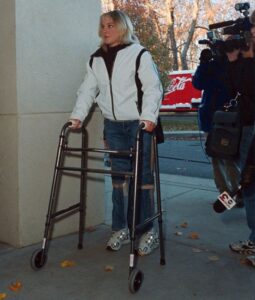On December 1, 1997, a 14-year-old boy named Michael Carneal walked into a Paducah, Kentucky, high school with a gun and “and opened fire in the lobby where students had gathered for a prayer circle.”
Three girls died. They were Nicole Hadley, 14; Kayce Steger, 15; and Jessica James, 17. Reading their names is important, so they’re not just statistics.
Five other students, three girls and two boys, were wounded. Shelley Schaberg, 17, was homecoming queen and earned a college basketball scholarship, but her injuries left her unable to play basketball (the college honored the scholarship anyway). Melissa “Missy” Jenkins, 15, was permanently paralyzed.
This happened when school shootings were uncommon (Columbine was 14 months later). Today, they’re common. School shooters usually don’t survive; they either commit suicide, or are killed by police. Another way for them to die is execution. Right now, a Florida jury is deliberating whether Nikolaz Cruz, the Parkland, Florida, school shooter who killed 17 and wounded 17 others, should be executed.
That wasn’t Carneal’s fate. After shooting eight students, he put the gun down, and told the school principal, “Kill me, please.” The principal didn’t oblige. He was arrested, pleaded guilty, and sentenced to life with possibility of parole after 25 years. He was kept in a juvenile detention facility until age 18, then transferred to an adult prison.
The 25 years are up, and Carneal’s parole hearing is on Monday, September 19, 2022. At the time of his original sentencing, everyone involved — his attorney, the prosecutor, the judge — recognized he was mentally ill. He’s been hospitalized several times for psychotic episodes during his incarceration.
Carneal’s current attorney told CNN that if he’s released he will “continue treatment through therapy and medication management at a mental health facility near his parents’ home.” She argues, “Over the past 25 years, Michael has demonstrated his ability to change, rehabilitate, and mature.”
If it were up to me, I’d say no. No, no, and no.
That’s nice, but not good enough. Nothing is. If someone rehabilitates in prison, fine, that’s warm and fuzzy. But keeping dangerous people out of society isn’t the only purpose of prisons, and even if a prisoner isn’t dangerous anymore, there are other reasons to keep him locked up: It’s punishment for what he did, and is a deterrent for others. I want everyone thinking about shooting up a school to know with certainty that if he does, he’ll end up dead or locked up for life.
Some experts argue that because kids’ brains aren’t fully developed or mature, it’s unfair to impose adult punishments on them. Our laws reflect this thinking; unless charged and convicted as adults, juveniles can’t be imprisoned past age 21. And Washington State, where I live, no longer locks up underage killers for life (see, e.g., story here). But is anyone asking what’s fair to the victims?
I don’t like that our society is saturated with guns. Predictably, gun crime is rampant. This weekend a 21-year-old Louisiana State University co-ed was shot to death while sitting in her car (story here); this isn’t even news anymore, it happens so frequently. The Republicans responsible for lax gun laws say get tough on crime. I’m for that, too.
I’ll start here: Don’t let Michael Carneal back into society. If he’s paroled from prison, he should go to a mental institution for safekeeping, not his parents’ home. And if Nikolas Cruz isn’t executed, he shouldn’t be considered for parole in 25 years or ever; he should never get out of prison.
Our society is too easy on gun crime. Some states, including Washington, have laws that add time for gun crimes (see RCW 9.94A.553(3) here). But seeking enhanced sentences is discretionary, and prosecutors can (and often do) plea-bargain them away; even when imposed, prisoners can get them reduced by good-time credit. There’s no certainty that committing crime with a gun means extra time, and that makes such laws meaningless.
 I’m angry and fed up. We let anyone have guns, including kids, and we coddle people who commit gun crimes. This makes innocent life cheap. People in other countries are looking at us and shaking their heads.
I’m angry and fed up. We let anyone have guns, including kids, and we coddle people who commit gun crimes. This makes innocent life cheap. People in other countries are looking at us and shaking their heads.
I want our society to get much tougher on violence. An obvious place to start is by denying Carneal parole and making him serve his life sentence. That won’t bring back the three dead girls, or help Missy Jenkins (photo, right) walk again. It’s nothing but retribution. But retribution is what victims, society, and the rest of us are entitled to.